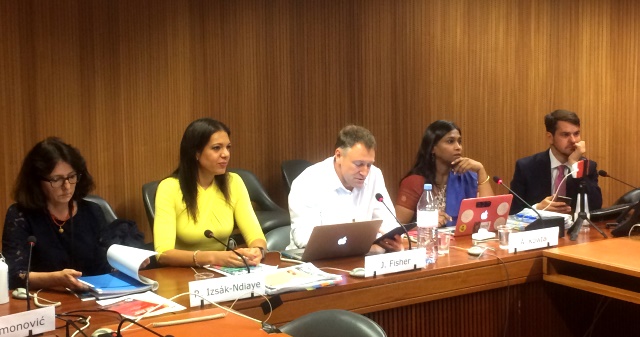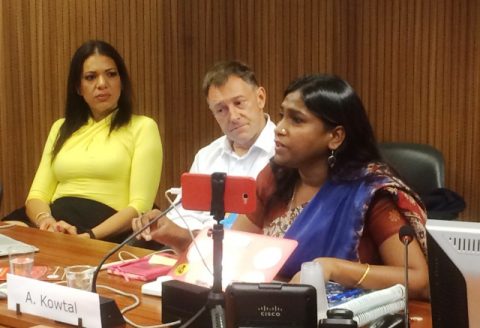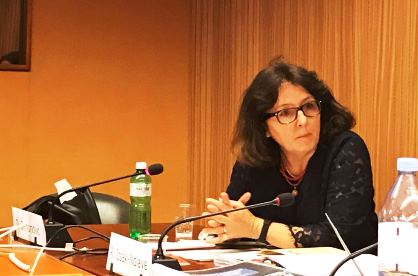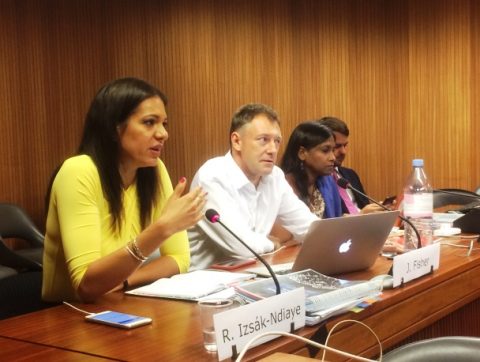HRC38 Event Report: #DalitWomenFight against Caste-Based Violence (21 June 2018)
June 28, 2018
On June 21, 2018, the side event titled “#DalitWomenFight against Caste-Based Violence” was organized at the 38th session of the UN Human Rights Council, by the International Movement Against All Forms of Discrimination and Racism (IMADR), Human Rights Watch (HRW), Minority Rights Group (MRG), Anti-Slavery International, FORUM-ASIA, and Franciscans International (FI). The event was supported by the National Campaign on Dalit Human Rights (NCDHR) and the International Dalit Solidarity Network (IDSN).

Mr. John Fisher from HRW moderated the event. Ms. Asha Kowtal, General-Secretary of the All India Dalit Mahila Adhikar Manch (AIDMAM) presented testimonies from victims in India. The panel of experts who responded to the testimonies included Ms. Vrinda Grover, Senior Advocate Supreme Court of India (via Skype), Ms. Dubravka Šimonović, UN Special Rapporteur on violence against women, and Ms. Rita Izsák-Ndiaye, Member of the UN Committee on the Elimination of Racial Discrimination (CERD).
 Ms. Kowtal pointed out the specificity of caste-based violence against Dalit women and girls. Victims of caste-based violence are disproportionately consisted of young women of college age. There is also a very high rate of sexual violence – supposedly six Dalit women are raped every day according to government data.
Ms. Kowtal pointed out the specificity of caste-based violence against Dalit women and girls. Victims of caste-based violence are disproportionately consisted of young women of college age. There is also a very high rate of sexual violence – supposedly six Dalit women are raped every day according to government data.
Ms. Kowtal introduced that the national campaign on Dalit women’s rights has been active in India including on organizing protests and conducting researches, and has constantly engaged with the UN human rights.
She questioned whether the UN considers caste-based crimes as one of the global crises of today. She stressed that there is no point in celebrating the Universal Declaration of Human Rights (UDHR) when these grave and heinous crimes are swept under the carpet.
Among hundreds of cases where the perpetrator goes scot-free, five testimonies were brought to the side-event, shedding light on a clear nexus between the police, the investigative officers and the machinery, going hand in hand with the perpetrators.
Ms. Kowtal presented a few testimonies, first of which was on the case also shown in the video ![]() – a 17-year-old college girl never made her way home. The police were not cooperative and only found her body five days later. Although the special legislation (the SC/ST Act) exists, none of the sections had been invoked, until one year after when the film crew brought it to a greater exposure. The investigation is still open and perpetrator is still at large, while the family, in hope of getting minimal compensation, are under continuous threat to compromise and close the case.
– a 17-year-old college girl never made her way home. The police were not cooperative and only found her body five days later. Although the special legislation (the SC/ST Act) exists, none of the sections had been invoked, until one year after when the film crew brought it to a greater exposure. The investigation is still open and perpetrator is still at large, while the family, in hope of getting minimal compensation, are under continuous threat to compromise and close the case.
The second case also happened in Haryana where two women, one of whom was in 6-month pregnancy, were brutally raped and left to die. The families who came to rescue them were also brutally beaten, who subsequently faced a lot of pressure in getting down a police report as well as a massive loan for the medical bills. A few of the perpetrators were arrested but most of them have absconded; no compensation has been made to the victims’ families.
The third case, a prolonged one, happened in Rajasthan where a girl was raped and was faced with tremendous threat to compromise and close the case. The family requested for police protection but was dismissed. The girl was finally not able to bear the pressure and committed suicide. Under public pressure from protests and demonstrations following her death, the case is up again for re-investigation.
Ms. Grover stressed that the vulnerability created by the intersectionality of caste and gender must be recognized. She pointed out that the issue is not that Dalit women are not aware of their rights, but rather, the clear pushback against Dalit women who actively seek justice. Behind the profound issue lies the scathing indictment of the criminal justice system.
Ms. Grover explained that there are two laws in India that apply to such cases: the Indian Penal Code and the Prevention of Atrocities Act (the Scheduled Castes and Scheduled Tribes Act, or the SC/ST Act), both of which have been repeatedly breached.
The laws were amended with the commitment to tackle the impunity for rape. Although they clearly stipulate that non-registration of complaint is a penal offence, no heed is paid to that. The absence of registration of complaints, victim protection programs and arrests of perpetrators, are results of administrative delay which cannot be passed off as mere negligence. Ms. Grover said that there is an institutional bias in the criminal justice system against Dalit women, which has to be recognized and addressed with collective measures in place.
She continued by highlighting a point brought home by all the cases: it is the economic deprivation which the Dalit community systematically suffers from that renders the young women and their families vulnerable to all forms of violence. The economic resources including land and drinking water are controlled by the dominant castes where the perpetrators are coming from. The families often have to make the choice either to ensure livelihood or to seek justice. However, even when the families, putting their entire existence at stake, decide to move forward and pursue justice, they receive not support but repression from the legal system.
She further regretted that while there are positive discourses going on in the country regarding women’s rights to body integrity and sexual autonomy, these rights are not guaranteed to Dalit women and these discourses do not reach the life of Dalit women.
 Ms. Šimonović started by recalling the long-term engagement that her mandate has had with the issue of violence faced by Dalit women. Ms. Šimonović acknowledged the efforts made toward justice and the engagement forged with UN Treaty Bodies and Special Procedures by the Dalit women’s movement. She encouraged the movement to proceed further on engagement with the UN mechanisms, to build on and develop beyond the knowledge from the past.
Ms. Šimonović started by recalling the long-term engagement that her mandate has had with the issue of violence faced by Dalit women. Ms. Šimonović acknowledged the efforts made toward justice and the engagement forged with UN Treaty Bodies and Special Procedures by the Dalit women’s movement. She encouraged the movement to proceed further on engagement with the UN mechanisms, to build on and develop beyond the knowledge from the past.
Ms. Šimonović said that she expects to continue on communications in respect of the impunity which clearly shows that the government is not acting in line with the laws.
She highlighted that the General Recommendation No.35 of the CEDAW, on gender-based violence against women, could be used specifically in the cases of Dalit women.
She pointed out that laws are in place but the implementation is lacking, therefore mechanisms like her mandate, and Treaty Bodies like CERD and CEDAW could be brought to more extensive and effective use.
Ms. Šimonović concluded by saying that she welcomes further engagement with her mandate both in the long term and for immediate actions, as well as with other Treaty Bodies in an integrated way.
 Ms. Izsák-Ndiaye started by questioning why the impact is still not exerted at the national level, despite pressure kept by grassroots movement and the UN mechanisms, having both been very active for many years. She stressed that it is important for the government to deliver the message that a person cannot commit such crimes and for the society to resist and reject stigmatization and racism. She continued by underlining the importance of communication on identity in a country, which sets basis for the sense of belonging and inclusiveness for its people. It is not only a matter of equal rights but also of equal dignity.
Ms. Izsák-Ndiaye started by questioning why the impact is still not exerted at the national level, despite pressure kept by grassroots movement and the UN mechanisms, having both been very active for many years. She stressed that it is important for the government to deliver the message that a person cannot commit such crimes and for the society to resist and reject stigmatization and racism. She continued by underlining the importance of communication on identity in a country, which sets basis for the sense of belonging and inclusiveness for its people. It is not only a matter of equal rights but also of equal dignity.
Ms. Izsák-Ndiaye pointed out that behind the manifestations of discrimination actually lies the biased mindset of people, to tackle which, discussions must be triggered to make people question the superiority and inferiority, through public discourse, media, and education. It is essential for people to believe that no matter where they are positioned, every group has contributed to the development of society and thus they must respect each other.
While acknowledging positive conditions in place in India including Article 17 of the Constitution on the abolition of untouchability, enactment of the SC/ST Act, availability of disaggregated data, she stressed that, to fill the gap between legislation and implementation, mechanisms and institutions must be put in place.
Ms. Izsák-Ndiaye went on to say that the next step lies with strengthening oversight bodies. Some mechanism has to be established to repair the failure of the first responders of complaints. She discussed potential differences it would make, in terms of trust and communication, if people from Dalit community were hired to work with police officers as community mediators.
She further remarked that participation by people from a vulnerable community at all levels of decision-making, regarding what affects them most, is an indispensable part of changing the situation. Furthermore, a quota system on judicial, administrative and other offices could be established to ensure Dalit representation at all levels.
Ms. Izsák-Ndiaye concluded by encouraging further engagement of the movement with the UN human rights system, not only during country reviews, but at any time, to strengthen the institutional mechanisms nationally.
Related Content

Newsletter E-CONNECT No.40 is out

Newsletter E-CONNECT No.39 is out

Newsletter E-CONNECT No.38 is out


